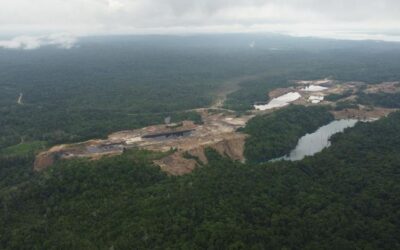 Briefing Paper
Briefing Paper
We as environmental organizations support all efforts in mitigating climate change and transitioning from fossil energy to renewable energy. One of them is the Green Infrastructure Initiative (GII) or Indonesian-German Initiative for Green Infrastructure.
The GII is a strategic bilateral initiative between the Government of Indonesia and the German Federal Government that has been agreed upon by both parties since 2019 in Berlin, Germany. Initially, The GII determined four provinces, namely West Java, Central Java, East Java, and Bali have been selected to be identified as potentials for investment projects and feasibility study development. Then in February 2022, the Government of Indonesia and the German Federal Government inaugurated pre-feasibility studies of 15 projects from West Java, Central Java, East Java, and Bali and also added two new GII provinces; Special Region of Yogyakarta and East Nusa Tenggara Province. The GII Projects are planned to will be taking place in 2023.
The GII’s background is Indonesia’s impressive socio-economic development over the past two decades has brought a substantial negative impact on the environment. The continuing lack of urban infrastructure has caused widespread congestion, and excessive pressure on electricity and water. This phenomenon leads to negative impacts on the environment and further increased emissions, caused by inadequate management. For example, only about 2% of Indonesian households are connected with water waste management, leading to fecal sludge leaking into the soil and river pollution. Meanwhile, the majority of Indonesia’s solid waste ends up in unsolicited landfills where untreated waste generates a huge amount of methane, a greenhouse gas that is 82% more potent than CO2. The continual growth of 6 major urban areas and the underdevelopment of public transportation leads to congestion that wastes 2.2 million liters of fuel and the loss of 6 million productivity hours each day.
The GII provides a five-year Financial Cooperation (FC) facility of up to EUR 2.5 billion to support climate-relevant infrastructure projects via subsidized and promotional loans through the German Development Bank (KfW) to promote green infrastructure in three thematic sectors: Solid Waste Management, Water and Wastewater Management, and Urban Public Transport.
Of all 15 proposed GII projects in the pre-feasibility study, six of them are in the Urban Public Transport sector, and four of the six projects are planned to use electric batteries which is the Battery Electric Busses (BEB). The four projects are:
- Bus Rapid Transit (BRT) – Bandung Metropolitan Urban Public Transport (Electric Bus) (Rp 1.1 trillion/ EUR 67 million)
- Surabaya BRT (Rp 1.5 trillion/ EUR 92 million)
- Corridor Petanglong (Greater Pekalongan) (Rp 735 billion/ EUR 45 million)
- Public Transport in Greater Solo: phasing out diesel fleets and Corridor Extension (Rp 1.9 trillion/ EUR 117 million)
The GII’s electrification plan for the Urban Public Transport sector needs to be supported. According to PLN, the transportation sector is the dominant CO2 emitter, the source of 78% of emissions in Jakarta. The Ministry of Industry targets the production of electric transportation to be 600.000 units of four-wheeled vehicles and 2.45 million of two-wheeled vehicles.The production of these electric transportations is expected to be able to reduce CO2 emissions by 2.7 million tons for four-wheeled vehicles and 1.1 million tons for two-wheeled vehicles.
However, the state’s mission to reduce emissions from the transportation sector and the GII project will be much more optimal if the energy source for electric transportation is low-carbon, not from fossil-fueled power plants, especially coal-based power plants (PLTU). According to RUPTL PLN data, in 2020, the total installed capacity of power plants in Indonesia is 62.449.20 MW, the majority, 51% of it, still comes from PLTU.
Because of the still high portion of coal in the power generating system to supply energy for public transportation which uses battery/electricity, the renewable energy project needs much help and support from many parties, from both Government of Indonesia and the International.
Therefore, we recommend that the GII program needs to include renewable energy development projects. With renewable energy as the main source of energy for the Urban Public Transport sector that will be built in the GII’s project, the project will be truly optimal in reducing emissions, not adding more the uses of fossil fuel/coal-based fuel which would increase emissions through power plants.
Contacts:
| Pius Ginting, AEER Coordinator [email protected] |
Meiki W Paendong WALHI West Java Executive Director [email protected] |



0 Comments